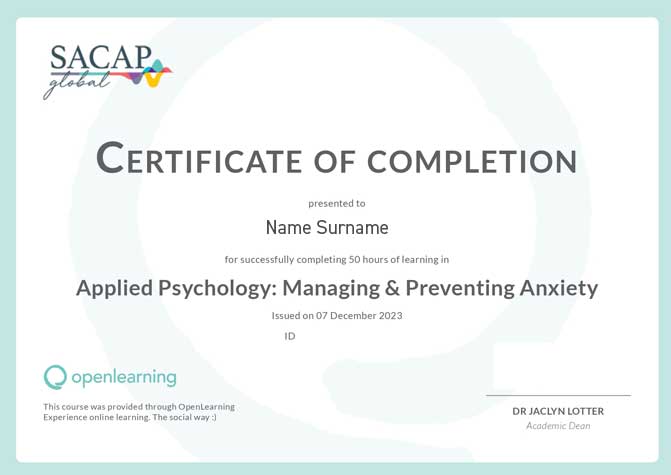Managing & Preventing Anxiety
R3,250.00

Course Overview
Anxiety is an emotion characterized by intense feelings of worry and fear. Build practical tools and knowledge to effectively address and manage anxiety.
The Managing & Preventing Anxiety short course explores anxiety, various manifestations, symptoms, preventive measures and management strategies.
This 50-hour course will give you a deep understanding of the psychological, emotional and physiological aspects of anxiety, along with the social and cultural influences that contribute to its development and impact.
The course aims to empower learners with a holistic approach to understanding and managing anxiety, emphasising the importance of self-awareness, compassion, and evidence-based practices in promoting mental well-being.
FAQs
What are the entry requirements?
Anyone 18 years of age or older can sign up for this short course. There are no academic entry requirements or conditions.
Who is this short course for?
This short course is for anyone wanting a comprehensive understanding of anxiety, from its various manifestations and symptoms to preventive measures and management strategies.
What is the time commitment?
A total of 50 hours is required to complete the short course.
What do you need to do the short course?
- Access to Microsoft Word
- Google Chrome (recommended)
- Stable internet connection
Is the short course accredited?
The short course is not accredited and non-credit bearing.
What is anxiety?
Anxiety is a feeling of fear, worry, dread, and uneasiness. “Normal” anxiety is short-term and related to a stressor. When anxiety is persistent and impacts one’s functioning, it needs attention to manage and minimise its impact in your life. Read more here.
Course highlights

-
Examine the psychological, emotional, and physiological dimensions of anxiety.
-
Gain a holistic perspective on the symptoms, preventive measures and effective management strategies for anxiety.
-
Build practical tools to better manage anxiety.
Dates and Registration
- Class of 2025 Jul-Sep: 1 July – 30 September
- Class of 2025 Oct-Dec: 1 October – 31 December
Short course classes are on demand allowing you to register at any time and move through course content at a time that suits you. Learners will have access to the course for the class period they choose when registering.
Learner Experience
Certification
Upon completion, you will receive a digital certificate of completion as evidence of the skills and knowledge demonstrated.

The Managing & Preventing Anxiety short course has been designed and developed by experts in the field of psychology. The course is for anyone needing to upskill in this area and offers 50 hours of learning.
What You’ll Learn
Through videos, readings and discussions, you will explore the following topics:
- The multifaceted nature of anxiety: Definitions, Symptoms and Types.
- Neurobiology of anxiety with insights into the intricate brain mechanisms and physiological responses associated with anxious states.
- The evolution of anxiety becoming a disorder.
- The nuanced interplay between emotional distress and clinical significance.
- Root causes of anxiety: biological, psychological, environmental, and genetic factors.
- How cultural differences influence the expression and management of anxiety.
- Risk factors tied to anxiety, encompassing age, gender, socioeconomic influences, and interactions with coexisting conditions.
- Managing and Preventing Anxiety: A diverse range of effective approaches.
- Principles of mindfulness, relaxation exercises, and cognitive-behavioural strategies for stress reduction.
- Understanding the role of therapies like Cognitive-Behavioral Therapy (CBT) and Exposure Therapy.
- Navigate through the nuanced landscape of medication and pharmacological interventions, deciphering their benefits and limitations.
- Expand your perspective with holistic practices such as pilates, meditation, and alternative therapies, weaving them into the fabric of anxiety management.
- Preventative measures, embracing lifestyle changes, coping strategies, stress management, resilience building, and self-care practices that collectively form a robust foundation against the onset of anxiety.
Course Outcomes
By the end of this course you will be able to:
- Define anxiety and identify the common symptoms.
- Describe the Neurobiology of Anxiety: including brain mechanisms and physiological responses involved in anxiety.
- Consider anxiety through the lens of the The Diagnostic and Statistical Manual of Mental Disorders (DSM).
- Describe the different types of anxiety.
- Analyse your own experience of anxiety by taking the anxiety test.
- Explain how anxiety becomes a disorder.
- Identify the various root causes that trigger anxiety: Biological, Psychological, Environmental factors, and Genetics and Family History.
- Differentiate Normal Anxiety from Anxiety Disorders.
- Identify the Role of Healthcare Providers in Diagnosis.
- Express a deep understanding of the need of a Comprehensive Approach to Anxiety Management.
- Explore mindfulness, relaxation exercises, and cognitive-behavioural strategies for stress reduction.
- Understand Cognitive-Behavioral Therapy (CBT), Exposure Therapy, and The Floating Technique.
- Explore the use of medication in treating anxiety disorders and understand their benefits and limitations.
- Integrate holistic practices such as meditation and alternative therapies in the management of anxiety.
The Team
The SACAP Global team brings a wealth of knowledge and practical experience across various disciplines. Our expert short course developers and dedicated support team are passionate about sharing their insights to help you get the most out of your online learning journey.

























